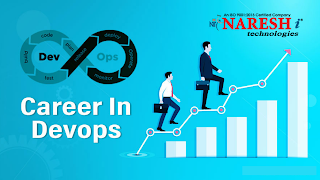Is DevOps A Good Career?
DevOps professionals are
among the highest-paid people in IT, and it’s the most demanding technical job
to do. DevOps is known as
movement, tools, and method. Others argue that “DevOps” in one position is
counterproductive for its goals. DevOps provides automation of software
delivery, as well as infrastructure updates, to involve specific tools and
services. But more importantly, DevOps aims to transform the way parts of a
software organization work together, staying between development, QA and
operations, and applying a combination of automation tools By combining
traditional silos with automation and collaboration, the organization can
collaborate to create, test, and release updates quickly and reliably.
Software products and infrastructure updates
can be released with much less risk and uncertainty, making the organization
more sensitive to customers. Many DevOps professionals started as system
administrator system programmers or multilingual programmers, with some
experience in infrastructure management. The common thread is the ability to
alternate between development, testing, and system administration. You can quickly get started in DevOps as a developer, system
administrator, DBA, QA or anywhere else, as long as you want to learn new tools
and technologies and be fully involved in what other teams in your organization
are doing. A DevOps career requires curiosity and willingness to train
outside the comfort zone and assumptions of your current role. Being a
successful bridge between teams requires a general understanding of the
business. The broad (rather than in-depth) approach will help you gain
practical experience in different roles and environments. You will continuously
learn new technologies and skills that can be applied elsewhere, so DevOps will
keep you from concentrating on a path.
Roles and
responsibilities of DevOps
The DevOps philosophy is
evolving rapidly, and new missions, roles, and responsibilities are emerging.
An interesting fact is that although companies list these roles separately,
there are many overlaps in the responsibilities, tasks, and skills required.
Most companies currently have the list of locations shown below for DevOps
engineers
DevOps
Architect
A DevOps architect is
responsible for analyzing and executing DevOps practices in the organization or
a team. Design the overall DevOps environment, bringing all effective DevOps
methodologies in line with industry standards. It provides the right tools for
automating processes. DevOps Architect also sets up a continuous build
environment to accelerate software development, testing, and the production
deployment process. In some organizations, a DevOps architect acts as a team
mentor, guiding developers and operational teams to solve problems. Monitor,
analyze, and manage technical operations from a leadership perspective.
Responsible
for publication
In a DevOps
environment, a version manager is responsible for planning, planning,
monitoring, and controlling the software development and distribution process.
Develop the development team and operations team to synchronize, allowing for
frequent but short feedback loops. A version manager is responsible for
defining the criteria for passing and accepting the current version of the
software. Use the CI / CD pipeline efficiently and neglect to build quality
standards. In the DevOps culture, a version manager is more people-centred and
tries to minimize the impact on the user. This means that in the DevOps
culture, a launch manager covers specific project manager roles.
Read More: Top 10 best technologies to
learn in 2020
In DevOps, global security is
commonly referred to as DevSecOps. Responsibilities include the use of various
tools, such as log management and configuration management, to ensure security.
In the traditional lifecycle
of cascading software development, security is primarily applied only when the
code is put into production. But in the DevOps culture, security is a critical
factor in all ongoing DevOps cycles.
Automation
engineer
In the DevOps world, an
automation engineer is responsible for developing and maintaining the CI / CD
process for all applications and their builds using tools such as Maven,
Jenkins, infrastructure and platforms that use configuration management tools
such as Ansible, Chef, Puppet, Salt Stack, Fabric, etc. He is also responsible
for creating and managing virtual machines and containers using tools such as
Vagrant, Docker, and Kubernetes. The automation engineer also performs
recording and monitoring activities using tools such as Nagios, Zabbix, ELK
stack, and Splunk.
Enroll now for: DevOps Online Training


Comments
Post a Comment